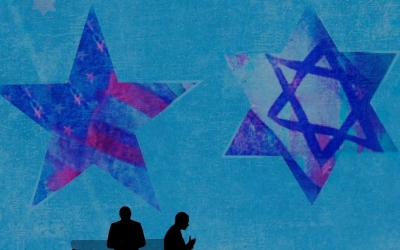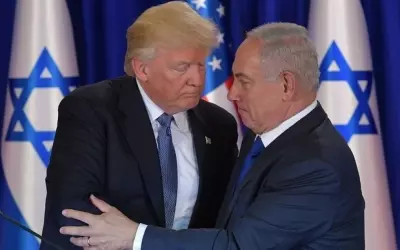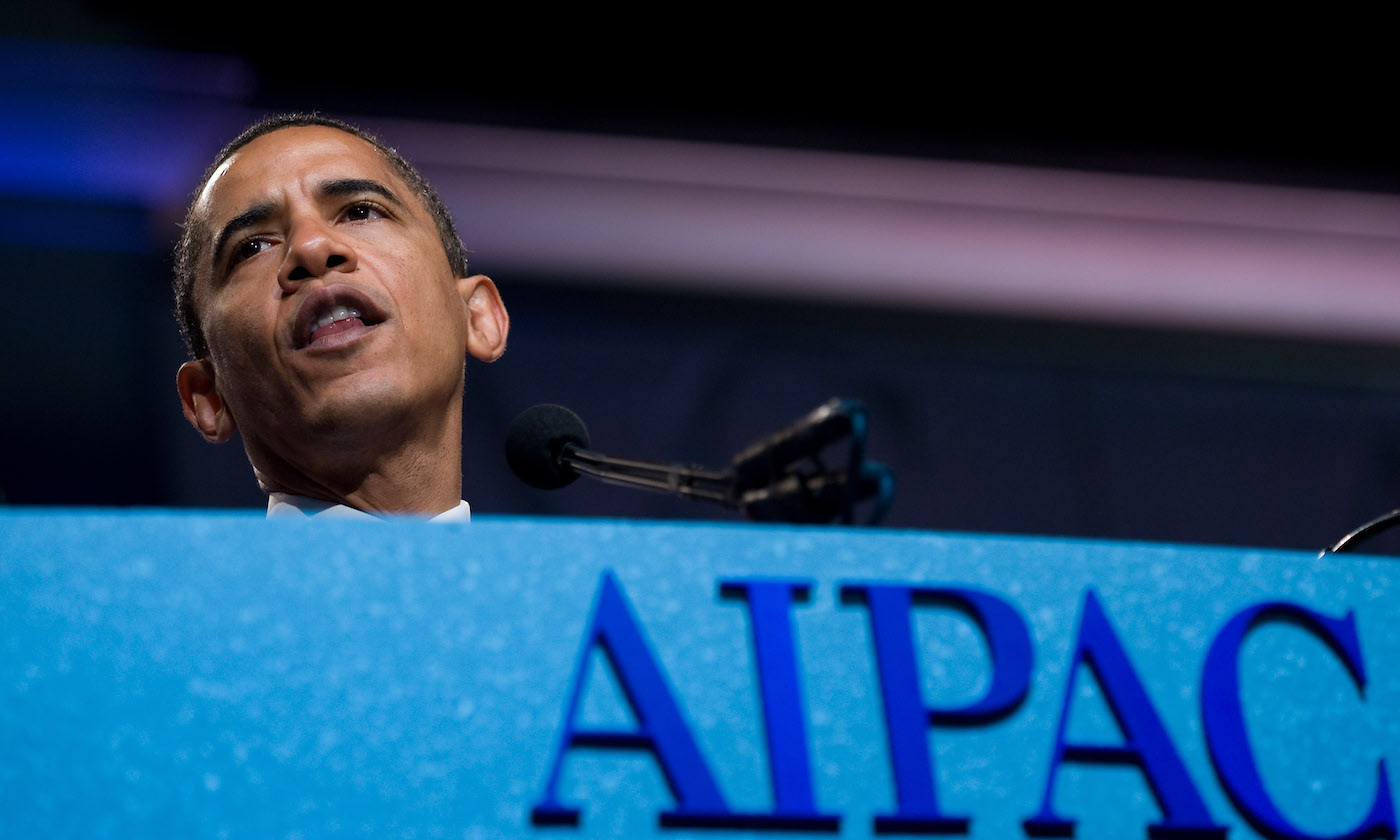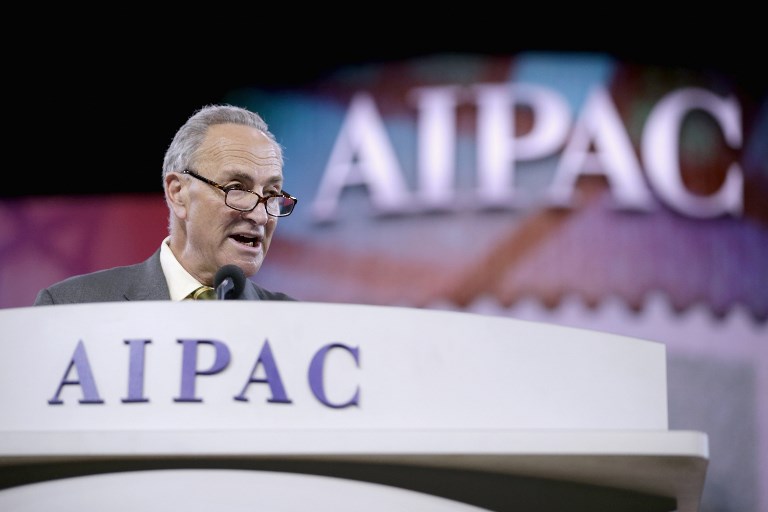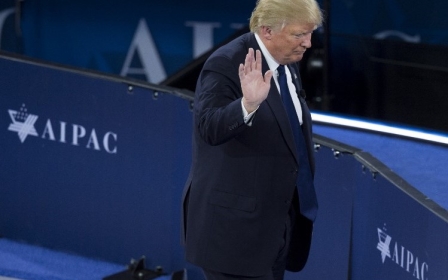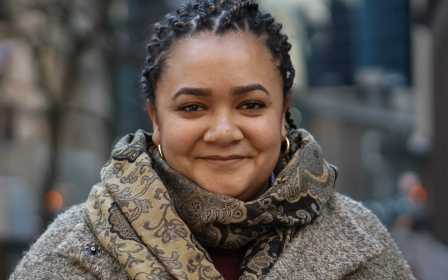The AIPAC conference: 60 years of pro-Israel rhetoric, policy and influence

During the autumn of 1953, American supporters of Israel were facing a crisis.
Israel was under pressure for breaking a UN-negotiated armistice agreement twice in just a few weeks. After carrying out raids in Egypt and Syria, Israeli forces massacred at least 69 Palestinians, mostly women and children, when they invaded Qibya, a then-Jordanian controlled West Bank village. Tensions snapped.
The United States protested, but the Israeli government remained intransigent, prompting Washington to quietly cut aid to the country and seek censure from the United Nations Security Council.
Back in the US, American supporters of Israel knew they had to organise to combat the public relations nightmare.
Within five months, the American Zionist Committee for Public Affairs (AZCPA) was born, the precursor to the American Israel Public Affairs Committee (AIPAC).
AIPAC hosted its first national conference in 1960.
The pro-Israel lobby group has held its policy conference every year since then, attracting some of the most powerful people and groups across the US.
This year's edition, being held in Washington from 24-26 March, is again set to draw top US lawmakers from both the Democratic and Republican parties, as well as Israeli leaders as they vie for support ahead of elections next month.
Here, MEE takes a look at key moments that shaped the AIPAC conference, from its humble beginnings to the major policy announcements and rhetoric that drew headlines over the past six decades.
1960: AIPAC's first national conference
The first AIPAC conference only had 45 attendees, according to the group's founder and executive director Isaiah L. Kenen.
While the number doesn't come close to the thousands that would attend the conference in the decades to come, AIPAC's influence was already strong in Washington by the early 1960s.
By then, Kenen and AIPAC's then-president, Rabbi Philip S. Bernstein, had been involved with lobbying groups for more than a decade.
Congressional records and government memos show the two met frequently with members of Congress and US State Department officials.
Unfortunately, not much is publicly known about that first conference, or several ones after.
In fact, the first mention of AIPAC in the New York Times archives does not appear until 6 April 1970, when the paper called the collective Israel lobby "one of the most potent in the Washington sub government".
1970: Gerald Ford says US must protect Israel from Soviet threat
On the first day of the 11th AIPAC conference, then-Republican Senator Gerald Ford called on US President Richard Nixon to lift Washington's freeze on "additional jet sales" to Israel.
Leaving the country vulnerable to the Soviet Union could have disastrous effects for Europe, Ford threatened.
"If we were to allow the Soviet Union, through brutal application of its own military force, to crush Israel, this would mean the end of hope for all free nations of the Mediterranean and even Western Europe," Ford said, according to records of his speech preserved in a presidential library.
Ford spoke at the conference every year from 1969 until 1973.
In 1974, he became Nixon's vice president, and later president, after Nixon's resignation. He did not speak at the AIPAC conference during his time in the executive branch.
1988: Reagan declines invitation to speak at AIPAC
Ronald Reagan's own staff, as well as members of the US Senate and US House of Representatives, had lobbied for him to speak at the AIPAC conference in 1988, according to memos and letters made public by The Ronald Reagan Library in 2013.
But the US president rejected the pressure and declined the invitation.
Seven years later, Bill Clinton became the first sitting US president to speak at the conference.
George W. Bush and Barack Obama also spoke at the event when they were in the White House, while Donald Trump addressed the AIPAC conference during his campaign for president in 2016.
Trump, who wasn't at the event in 2017 and 2018, and isn't on the list of confirmed speakers this year either, will likely be there in 2020 as he seeks reelection.
1995: Bob Dole voices support for US embassy move to Jerusalem
US Senator Bob Dole, a year before he secured the Republican Party's nomination to run for president, stood up in front of the AIPAC conference to pledge his support for the plan to move the US embassy from Tel Aviv to Jerusalem.
In his address, Dole said that not only was he "proud" to support the move, but he was ready to "move beyond letters".
“So tomorrow I will introduce the Jerusalem Embassy Relocation Implementation Act," said Dole, who was then Senate majority leader - and he did.
While the act passed in 1998, US presidents continually signed a waiver to prevent it from being enacted on the ground, amid concerns that moving the embassy to Jerusalem would be destabilising and upend decades of US policy on the conflict.
That all changed in December 2017, however, when Donald Trump became the first US president to recognise Jerusalem as the capital of Israel and announced his plan to move the embassy to the city.
2005: Israel's national anthem dropped
For the first time in the conference's history, only the US national anthem was played at the conference, while Hatikvah, Israel's national anthem, was dropped.
Nine months before the conference took place, rumours circulated that a high-level Pentagon official was being investigated on suspicion of spying for Israel. The official was believed to have given classified information to two AIPAC officials, who were then suspected of passing that information over to Israel.
The AIPAC officials, Steven J. Rosen and Keith Weissman, were charged under the Espionage Act. In 2009, however, US Justice Department prosecutors went against the FBI's advice to take the pair to trial and instead dropped the case.
AIPAC has historically denied accusations that it serves as an arm of official Israeli state diplomacy.
That led attendees at the 2005 conference to speculate that the decision to drop Israel's national anthem was an attempt by the group to show its loyalty to the US government.
2008: Obama seeks AIPAC backing before election
The day after then-Illinois Senator Barack Obama gained the Democratic nomination for president, he took to the stage at AIPAC's conference to quell doubts and assure the group's supporters that he was "a true friend of Israel".
"I want to say that I know some provocative e-mails have been circulating throughout Jewish communities across the country," Obama told the crowd.
"A few of you may have gotten them. They're filled with tall tales and dire warnings about a certain candidate for president. And all I want to say is - let me know if you see this guy named Barack Obama, because he sounds pretty frightening."
During his speech he talked about his grandfather and great-uncle's service in WWII and spoke at length on the horrors of the Holocaust.
Many Democrats have fiercely criticised Trump for moving the US embassy to Jerusalem, but in 2008 Obama also pledged that the entire city would remain Israel's capital.
"Jerusalem will remain the capital of Israel and it must remain undivided," he told the AIPAC conference.
2016: Trump attacks Obama, prompting apology from AIPAC president
Then in the midst of his presidential campaign, Donald Trump received a roaring applause at the AIPAC conference when he called Barack Obama "maybe the worst thing to happen to Israel".
"With President Obama in his final year — yay!" Trump told the crowd.
But while the now-president's disparaging remarks against Obama appealed to the attendees, his speech pushed AIPAC President Lillian Pinkus and four other leaders of the organisation to personally apologise.
Trump's comments had enraged Democrats, who feared the timing of his remarks - in the middle of an election campaign - would hurt them at the polls.
"While we may have policy differences, we deeply respect the office of president of the United States and our president, Barack Obama," Pinkus said.
"There were people in our AIPAC family who were deeply hurt last night, and for that we are deeply sorry. We are disappointed that so many people applauded the sentiment that we neither agree with or condone."
Pinkus's apology is one example of how AIPAC has sought to keep support for Israel a bipartisan issue, as the organisation wants both Democrats and Republicans to demonstrate unequivocal support for the country.
However, Obama's presidency shattered that idea, after Israeli Prime Minister Benjamin Netanyahu publicly chastised and frequently undermined America's first black president.
In 2015, Netanyahu delivered a speech in Congress without an official invite from the then-president - a move seen as an insulting breach of diplomatic norms. Many Democratic lawmakers boycotted the address.
The animosity between the two leaders was evident for the duration of Obama's time in the White House, despite the fact that the US president continued to send billions of dollars to the Israeli government.
In fact, just before he left office, Obama pledged a record $38bn in military aid to Israel.
During his speech at the 2016 conference, Trump also pledged to move the US embassy to Jerusalem - a promise he fulfilled during his first year of presidency.
2018: Top Democrat says there is no peace because Palestinians 'don't believe in the Torah'
Chuck Schumer, a top US Democratic senator, drew the ire of Palestinians and their supporters after he took the stage at the 2018 AIPAC conference to blame the lack of peace on the fact that Palestinians don't believe in the Torah, the set of books on Jewish laws and practices.
"Of course, we say it's our land, the Torah says it, but they don't believe in the Torah. So that’s the reason there is not peace," Schumer said.
"Too many people don't understand that here in America," he continued.
Ideological Israeli settlers and supporters of the country's settlement movement, which violates international law, often point to the Torah as the basis for their claim to the occupied Palestinian territories.
Despite his controversial comments, AIPAC announced this month that Schumer would be one of the speakers at the 2019 conference. He also remains one of the top-ranking Democrats in the US Congress.
2019: First Israeli settlement leader to speak
For the first time in AIPAC conference history, an Israeli settlement leader will address attendees.
Oded Revivi, a top figure within the Yesha and Efrat settlement councils, will speak during a side-panel at the 2019 conference called "Catch 67: The Left, The Right, and the Legacy of the 6-Day War".
"AIPAC has finally realised that they cannot ignore half-a-million people living in Judea and Samaria, who are becoming more and more attractive to the audience of AIPAC," Revivi told the Jerusalem Post, using the term Israeli settlers use for the occupied West Bank.
This year's AIPAC conference also comes only a few weeks before parliamentary elections in Israel. The two main contenders vying for the prime minister's office - Netanyahu and top Israeli military leader Benny Gantz - are both expected to speak during the event in Washington.
Middle East Eye delivers independent and unrivalled coverage and analysis of the Middle East, North Africa and beyond. To learn more about republishing this content and the associated fees, please fill out this form. More about MEE can be found here.


